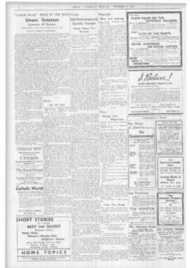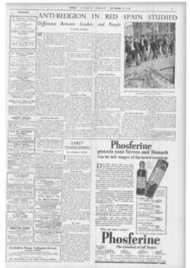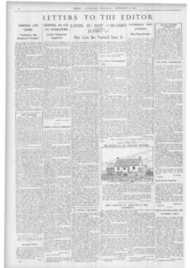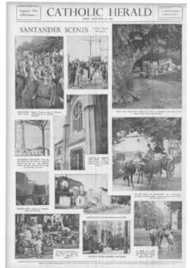Page 12, 17th September 1937
Page 12
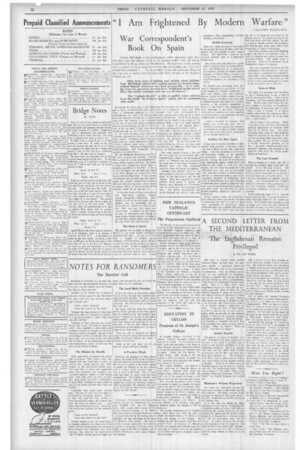
Report an error
Noticed an error on this page?If you've noticed an error in this article please click here to report it.
Tags
Share
Related articles
" In Franco's Spain "
Gen. O'duffy Accuses Capt. Mccullagh And Efen S Rich Brigade
European War
Open Town Bombing Regular Practice Of Reds
Hagiography
" I Am Frightened By Modern Warfare "
—Says CAPT. McCULLAGH
War Correspondent's Book On Spain
Captain McCullagh, a war correspondent whose experience goes back over forty years, has written a book on the Spanish conflict which will shortly be published by Burns, Oates and Washbourne. His experience of the present war is unsullied by the propaganda of either side; as he points out, " as a maltreated hack journalist " . . one is not likely to miss the unpleasant things in the same way as would (and did) influential M.P.s, Prelates of the Anglican Church, etc., etc.
After forty years of fighting and writing about fighting, Capt. .McCullagh admits that modern warfare is a terrible thing, without humour, honour, or any kind of sympathy. He is retiring from his profession because he is " frightened by the sort of thing into which revolution and war are developing."
The "Catholic Herald" is able to publish below extracts from this book "In Franco's Spain," which will be continued next week.
During the last forty years I have taken part in many revolutions and wars, sometimes as combatant, generally as a warcorrespondent, but now T am leaving the game, not because I am too old—I am only sixty-three—but because I am frightened by the sort of thing into which revolution and war arc developing; and this will therefore be the last book I shall write about revolutions and wars that t have seen.
In the good old days, wars were oldfashioned, gentlemanly contests for something tangible, something which even the dullest reporter could understand—empire, territory, colonies, gold mines, railways (Cape-to-Cairo, Moscow-to-Vladivostock, Berlin-Baghdad); and revolutions were harmless demonstrations . . .
But the Bolshevist Revolution and Civil War were no picnic for anybody. A Civil War is hard on the war-correspondent because nobody wants to see him. He is like an inquisitive stranger in a house where a domestic squabble is in full blast. If he is on the Insurgent side, he finds that there is no Press Bureau, no organisation for dealing with his despatches. If he is on the Government side, he finds that the regular censor has actually resigned his comfortable post and taken up arms, a thing which no regular officer, in full possession of his faculties, would do in ordinary war . . .
In the Red Army of Russia everything was topsy-turvy, original, strange, savage, unexpected, disquieting. Most disquiet of all for the newspaper correspondent was the knowledge that the Soviet did not regard even him as neutral. Who was not with them was against them. A stoker's son they hailed as one of themselves even though he came from a foreign country. A banker's son was their natural enemy, even though he came from their own country • . .
The Same in Spain The present war in Spain is being conducted on the same sinister, unexpected, uncomfortable lines. It also is a Civil War, a struggle of religion against irreligion, of Conservative against Revolutionary, of town against country, of artisan against peasant. It also is negligible from the military point of view, but all-important from the moral point of view, and even from the political point of view. It also has distinguished itself by wholesale murders on a stupendous scale, and those murders have been accompanied by a cruelty unsurpassed in Europe for at least five hundred years. Worst of all, Europe. which was horrified by the crimes of the Russian Reds, is not very much shocked by the crimes of the Spanish Reds: Europe is getting accustomed to cruelty ...
That such is the case can be seen by a comparison of England's present attitude towards Nationalist Spain and her attitude towards the' Bolshevist Russia of 1918, 1919, and 1920. To me there seems no essential difference between this Spain and that Russia : any difference which exists is mostly in Franco's favour.
One point against Franco is the fact that he is fighting the established Government of his country, but the clique in power at Valencia now has practically the same aims as the clique in power at Moscow then: the latter conquered power by force, the former by cunning.
Kolehak and Denikin were in the same position as Franco and Mola. They stood for the old country and the old religion. They were opposed to a Government which meant to jettison all Russia's past, including her Christianity and her whole social and economic systems. The British Government supported Kolehak and Denikin with men, equipment, rifles, ammunition, artillery, warships, and money ..
British Criticism There was violent criticism of this policy by the English Radicals, Pacifists, and Communists, the same people as now oppose Franco. The Manchester Guardian denounced Kolchak then as it denounces Franco now.
But on the other side there was a great body of opinion which was estranged for ever from Bolshevism by its massacres, its systematic murder of women and of hostages, its Secret Police, its policy of pulling down, its wholesale confiscation of private property, its unleashing of the Terror.
The English and Americans were particularly shocked at its connivance in the brutal murder by Russian bluejackets of their own officers, who were generally thrown, bound, into holes made in the ice. When I came to London at this time from a Moscow prison and spoke at a London meeting of the atrocities committed in Russia by the Reds, I was introduced by Lord Burnham of the Daily Telegraph, who acted as chairman and was supported on the platform by i epresentatives of every religious body in England. . . .
When I returned to London from Spain, a few weeks ago, there was no meeting to protest against the massacres perpetrated by the Reds in Spain, though they were worse than those perpetrated by the Russian Bolsheviks.
Seeking the Real Spain A long stay in Espana Liherata as a maltreated, hack journalist is advisable, otherwise one is likely to 'miss the unpleasant things. I had the advantage of arriving in the Nationalist G.H.Q. as an unknown newspaperman, conspicuously short of money, lacking any kind of introduction, and representing papers which could not afford to take cables or even hire me a donkey, but the result was good for 1 saw officialdom as it was, not as it presented itself, wreathed in smiles, to British majorsgeneral, to celebrated authors, and to distinguished Members of Parliament who came in Rolls-Royces with most flattering testimonials from extremely important persons, and afterwards toured the country for one week under the direction of young English-speaking Spaniards educated at Stonyhurst.
A long sojourn under the conditions I have indicated makes one see the Nationalist movement for what it is, one of those great movements of resurrection which sometimes pass over a people who seem to be dead. But the visitor must look high up, for if he keeps his eyes fixed on the ground and on the people moving in the dust and smoke and mist thereof, he sees so much to disturb, confuse and scandalise him that he may come away with a very wrong idea of what is happening.
T have been in Spain, and in the following pages I tell what I saw and how I felt. I came to England and talked to men who distrusted Franco. The whole result is given here. Some of it is in favour of the Nationalists, some of it against.
My most important discovery was the enthusiasm of the Nationalists. One cannot condense enthusiasm into a hundredword cable. One cannot measure its heal with a thermometer. One tnust go and feel it. I felt it, and, having felt it. I came to the conclusion that it will win.
General Mola The value of a personal visit was never so clearly demonstrated to me as when I saw the late General Mola. I had read his broadcasts and been greatly impressed by them. Written with a fine literary flavour, they testified to his belief in Christianity, in scholarship, in discipline, and in Spain. " Here," I said to myself, " is a sincere Catholic who knows his religion as well as any theologian, and who is, at the same time, a great patriot."
But of course I was not sure. When I saw him, I was sure, for a man with the personal appearance of General Mola must be an honest man. Shy, plain, awkward, with a pair of steel spectacles balanced unevenly on the bridge of his red nose, be looked like a professor rather than a soldier. He was the best strategist of all the Nationalist generals, yet he was a genuinely humble-minded man, genuinely surprised and confused by the applause with which the civilian public always greeted him. . . .
The Last Crusade When I looked at it from afar off, it seemed the grandest sight I had ever witnessed. It was the Last Crusade. But when I arrived on the scene of action, 1 found it almost impossible to see the glory that had lured me across the ocean. All I saw was disorganisation, laziness, and in civility. All I experienced was hardship such as I had never before encountered in any war, confusion, muddle, insufferable arrogance, sometimes, on the part of officialdom.
In the following pages I try to keep the snowy peak in sight, or at least in memory, while recording faithfully the unpleasantnesses. In this book I give criticism as well as praise, and I hope that one will correct the other in such a way that a fairly correct picture of Franco's Spain wilt emerge.
blog comments powered by Disqus





